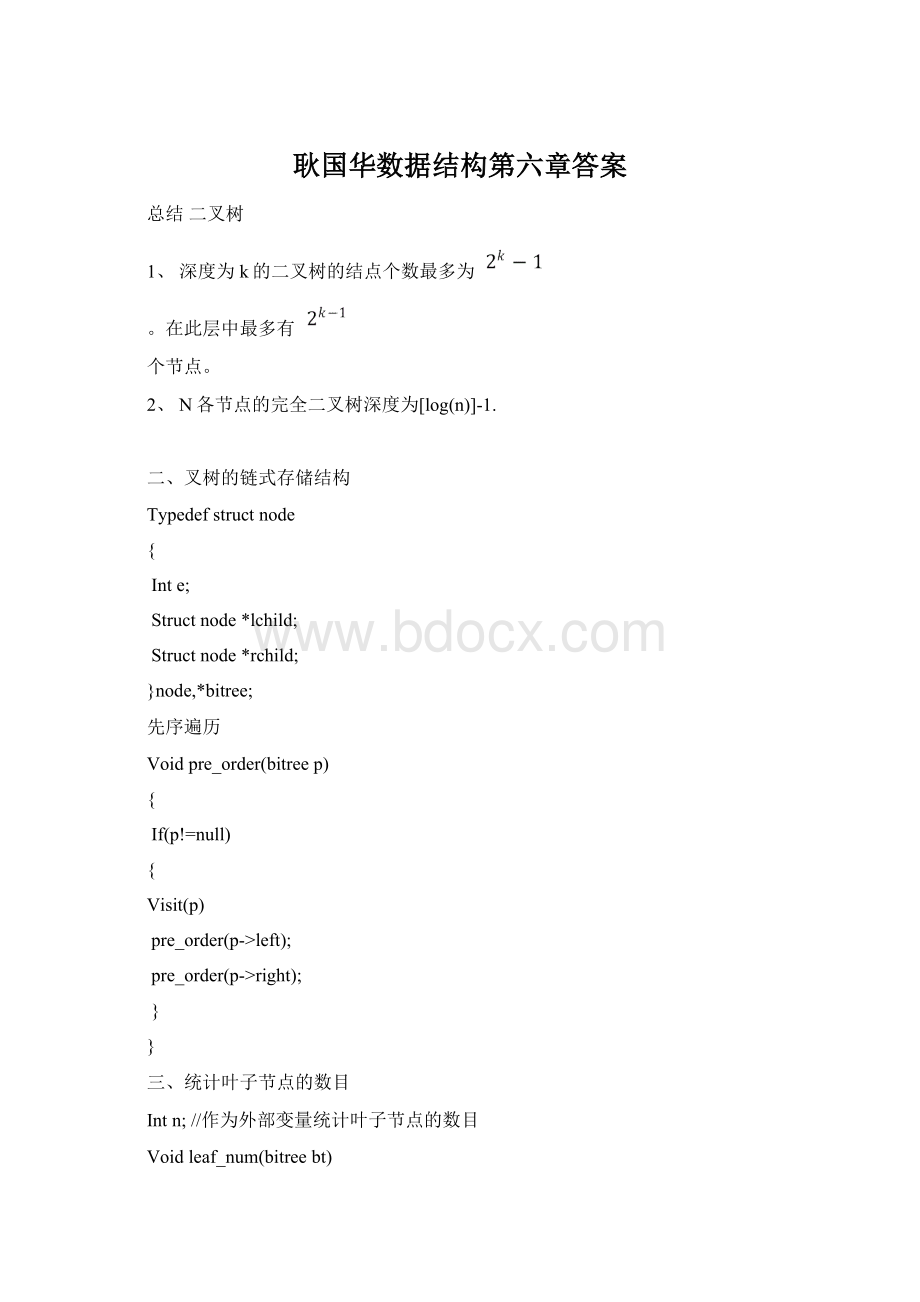耿国华数据结构第六章答案.docx
《耿国华数据结构第六章答案.docx》由会员分享,可在线阅读,更多相关《耿国华数据结构第六章答案.docx(20页珍藏版)》请在冰豆网上搜索。

耿国华数据结构第六章答案
总结二叉树
1、深度为k的二叉树的结点个数最多为
。
在此层中最多有
个节点。
2、N各节点的完全二叉树深度为[log(n)]-1.
二、叉树的链式存储结构
Typedefstructnode
{
Inte;
Structnode*lchild;
Structnode*rchild;
}node,*bitree;
先序遍历
Voidpre_order(bitreep)
{
If(p!
=null)
{
Visit(p)
pre_order(p->left);
pre_order(p->right);
}
}
三、统计叶子节点的数目
Intn;//作为外部变量统计叶子节点的数目
Voidleaf_num(bitreebt)
{
If(bt!
=null)
{
If((bt->left==null)&&(bt->right==null))
N++;
Leaf_num(bt->left);
Leaf_num(bt->right);
}
}
Intleaf_num(bitreebt)
{
Intn;
If(bt==null)
N==0;
Elseif((bt->left==null)&&(bt->right==null))
N==1;
Else
{
N=leaf_num(bt->left)+leaf(bt->right);
}
Returnn;
}
四、求二叉树的高度
Intheight(bitreebt)
{
Intheight,m,n;
If(bt==null)
{
Height=0;
}
Else
{
m=height(bt->leftchild)+1;
n=height(bt->rightchild)+1;
if(m>n)
height=m;
else
height=n;
}
Returnheight;
}
五、中序与后序的非递归算法
Voidinorder(bitreebt)
{
Inte;
Sqstacks;
Initstack(&s);
Bitnodep;
P=s;
While((!
emptystack(s))||(p))
{
While(p)
{
Push(&s,p);
P=p->leftchild;
}
If(!
emptystack(s))
{
pop(&s,&p);
Visit(p->data);
P=p->rightchild;
}
}
后续非递归:
Voidlast_order(bitreebt)
{
Bitnode*p,*q;
Bitrees[stack_size];
P=bt;
Q=null;
While((p)||(!
emptystack(s)))
{
While(p)
{
Push(&s,p);
P=p->leftchild;
}
If(!
emptystack(s))
{
gethead(s,&p);
If((p->rightchild==null)&&(p->rightchild==q))
{
Pop(&s,&p);
Visit(p);
Q=p;
P=null;
}
Else
P=p->rightchild
}
}
}
六、线索二叉树
中序线索二叉树找前驱
bitnode*find_pre(bitnode*p)
{
Bitnode*q;
If(p->lefttag==1)
Returnp->leftchild;
Else
{
q=p->leftchild;
While(p->righttag==0)
{
Q=p;
P=p->rightchild;
}
Returnq;
}
}
Bitnode*find_last(bitnode*p)
{
Bitnode*q,*pre;
Q=p;
If(q->righttag==1)
Returnq->rightchild;
Else
{
Q=q->rightchild
While(q->righttag==0)
{
Pre=q;
Q=q->rightchild;
}
Returnq->rightchild;
}
}
七、二叉树相似性的判断
#defineok1
Inttre_alike(bitreeb,bitreea)
{
Intm,n;
Bitnode*p,*q;
P=a;
Q=b;
If((a==null)&&(b==null))
{
Returnok;
}
Elseif(((a!
=null)&&(b==null))||((a==null)&&(b!
=null)))
{
Reuturnnull;
}
Else
{
M=tre_alike(b->left,a->left);
N=tre_alike(b->left,a->left);
Returnm*n;
}
}
求根节点到r之间的路径
voidpath(bitreebt,bitnide*r)
{
Bitnode*p,*q;
Inttop=0,I,flag=0;
Bitrees[stacksize];
P=bt;
Q=null;
While((p!
=null)||(top>=0))
{
While(p!
=null)
{
top++;
S[top]=p;
If(top>max)
{
Flag=-1;
Break;
}
P=p->leftchild;
}
If(top>0)
{
P=S[top];
If((p->right==null)||(p->rightchild==q))
{
If(p==r)
{
For(i=1;i<=top;I++)
Print(“%d”,p->data);
Top=0;
}
Else{
Q=p;
P=null;
Top--;
}
}
Else
{
P=p->rightchild;
}
}
}
}
层次遍历二叉树
Voidlevel_order(bitreebt)
{
Bitnode*p;
Queen*q;
Init(q);
If(bt==null)
Return;
Else
{
P=bt;
Enqueue(q,p);
While(!
isempty(q))
{
dequeue(q,p);
visit(p);
if(p->leftchild!
=null)
Enqueue(q,p->left);
If(p->rightchild!
=null)
Enqueue(q,p->right);
}
}
}
习题
12、
Voidfind(bitreeL,intI,intj)
{
Intm,n;
While((i!
=j)&&(i>0)&&(j>0))
{
If(i>j)
{i=i/2;}
Else
{
J=j/2;
}
If(i==j)
ReturnL[i]->data;
Else
ReturnL[0]->data;
}
}
13、
intfound=FALSE;
Bitree*Find_Near_Ancient(BitreeT,Bitreep,Bitreeq)//求二叉树T中结点p和q的最近共同祖先
{
Bitreepathp[100],pathq[100]//设立两个辅助数组暂存从根到p,q的路径
Findpath(T,p,pathp,0);
found=FALSE;
Findpath(T,q,pathq,0);//求从根到p,q的路径放在pathp和pathq中
for(i=0;pathp[i]==pathq[i]&&pathp[i];i++);//查找两条路径上最后一个相同结点
returnpathp[--i];
}//Find_Near_Ancient
voidFindpath(BitreeT,Bitreep,Bitreepath[],inti)//求从T到p路径的递归算法
{
if(T==p)
{
found=TRUE;
return;//找到
}
path[i]=T;//当前结点存入路径
if(T->lchild)Findpath(T->lchild,p,path,i+1);//在左子树中继续寻找
if(T->rchild&&!
found)Findpath(T->rchild,p,path,i+1);//在右子树中继续寻找
if(!
found)path[i]=NULL;//回溯
}//Findpath
14、两种方法
(1)、
Intn=0;
voidleaf_num(bitreebt)
{
If(bt!
=null)
{
If((bt->leftchild==null)&&(bt->rightchild==null))
{
N++
}
Else
{
leaf_num(bt->leftchild);
leaf_num(bt->rightchild);
}
}
}
2、
Intleaf_num(bitreebt)
{
IntI;
If(bt==null)
I=0;
Elseif((bt->leftchild==null)&&(bt->rightchild==null))
{
I=1;
}
Else
{
I=leaf_num(bt->left)+leaf_num(bt->right);
}
ReturnI;
}
15、
intDel-subtree(Bitreebt){
//删除bt所指二叉树,并释放相应的空间
if(bt){
Del-subtree(bt->lchild);
Del-subtree(bt->rchild);
free(bt);
}
returnOK;
}//Del-subtree
StatusSearch-del(Bitreebt,TelemTypex){
//在bt所指的二叉树中,查找所有元素值为x的结点,并删除以它为根的子树
if(bt){
if(bt->data==x)Del-subtree(bt);
else{
Search-Del(bt->lchild,x);
Search-Del(bt->rchild,x);
}
}
returnOK;
}//Search-Del
16、
BitreePreOrder_Next(Bitreep)//在先序后继线索二叉树中查找结点p的先序后继,并返回指针
{
if(p->lchild)returnp->lchild;
elsereturnp->rchild;
}//PreOrder_Next
分析:
总觉得不会这么简单.是不是哪儿理解错了?
6.57
BitreePostOrder_Next(Bitreep)//在后序后继线索二叉树中查找结点p的后序后继,并返回指针
{
if(p->rtag)returnp->rchild;//p有后继线索
elseif(!
p->parent)returnNULL;//p是根结点
elseif(p==p->parent->rchild)returnp->parent;//p是右孩子
elseif(p==p->parent->lchild&&p->parent->tag)
returnp->parent;//p是左孩子且双亲没有右孩子
else//p是左孩子且双亲有右孩子
{
q=p->parent->rchild;
while(!
q->ltag||!
q->rtag)
{
if(!
q->ltag)q=q->lchild;
elseq=q->rchild;
}//从p的双亲的右孩子向下走到底
returnq;
}//else
先序后继:
Bitnode*find_pre(bitnode*P)
{
If(p->lefttag==0)
{
Returnp->leftchild;
}
Else
{
Returnp->rightchildl
}
}
后继前驱:
Void*find_last(bitnode*q)
{
If(p->righttag==0)
{
Returnp->leftchild;
}
Else
{
Returnp->rightchildl
}
}
19、
intGetDepth_CSTree(CSTreeT)//求孩子兄弟链表表示的树T的深度
{
if(!
T)return0;//空树
else
{
for(maxd=0,p=T->firstchild;p;p=p->nextsib)
if((d=GetDepth_CSTree(p))>maxd)maxd=d;//子树的最大深度
returnmaxd+1;
}
}//GetDepth_CSTree
intLeafCount_CSTree(CSTreeT)//求孩子兄弟链表表示的树T的叶子数目
{
if(!
T->firstchild)return1;//叶子结点
else
{
count=0;
for(child=T->firstchild;child;child=child->nextsib)
count+=LeafCount_CSTree(child);
returncount;//各子树的叶子数之和
}
}//LeafCount_CSTree
intGetDegree_CSTree(CSTreeT)//求孩子兄弟链表表示的树T的度
{
if(!
T->firstchild)return0;//空树
else
{
degree=0;
for(p=T->firstchild;p;p=p->nextsib)degree++;//本结点的度
for(p=T->firstchild;p;p=p->nextsib)
{
d=GetDegree_CSTree(p);
if(d>degree)degree=d;//孩子结点的度的最大值
}
returndegree;
}//else
}//GetDegree_CSTree
20、
Voidlast_order(bitreebt)
{
Bitreea[max];
Bitnode*p,*q;
P=bt;
Q=null;
Inttop=0;
While((top>0)||(p!
=null))
{
While(p!
=null)
{
Top++;
Overflow();
A[top]=p;
P=p->left
If(top>0)
{
P=a[top];
If((p->righchild==null)||(p->right==q))
{
Visit(p);
Q=p;
P=null;
Top--;
}
Else
P=p->right;
}
}
}
}
21、
Intzheze(intflag,bitreebt)
{
If(flag!
=0)
{
If(bt==null);
Elseif(((bt->leftchild==null)&&(bt->rightchild!
=null))||(((bt->leftchild!
=null)&&(bt->rightchild==null)))
Flag=1;
Else
{
Flag=zheze(flag,bt->left)+zheze(flag,bt->right)
}
}
Returnflag;
}
22、
intn[M];//向量存放各层结点数
inti=1;
intmax=0;//最大宽度
#defineM10//假设二叉树最多的层数
intWidth(BinTreeT)
{
if(T)
{
if(i==1)//若是访问根结点
{
n[i]++;//第1层加1
i++;//到第2层
if(T->lchild)//若有左孩子则该层加1
n[i]++;
if(T->rchild)//若有右孩子则该层加1
n[i]++;
}
else
{//访问子树结点
i++;//下一层结点数
if(T->lchild)
n[i]++;
if(T->rchild)
n[i]++;
}
if(maxWidth(T->lchild);//遍历左子树
i--;//往上退一层
Width(T->rchild);//遍历右子树
}
returnmax;
}//算法结束
希望可以给你帮助!
23、先序的非递归算法
Voidpre_order(bitreebt)
{
Bitnode*p;
Inttop=0,i=0;
P=bt;
Bitrees[max];
While(top>0||p!
=null)
{
While(p!
=null)
{
top++;
If(t>=mpax)
Return;
A[top]=p;
P=p->left;
}
If(top>0)
{
P=S[top--];
Visit(p);
If(p->right)
P=p->right;
}
}
}
26、交换左右子树
Voidchange(bitreebt)
{
If(bt!
=null)
{
Bitnode*p,*q;
P=bi->left;
Q=bi->right;
Bi->right=p;
Bi->left=q;
change(p);
change(q);
}
}
27、遍历前序线索树
Bitnode*first(bitreebt)
{
If(bt!
=null)
Returnbt;
Else
Returnnull;
}
Bitnnode*next(bitnode*p)
{
If(p->lefttag==0)
Returnp->leftchild;
Else
Returnp->rightchild;
}
Voidvisit_all(bitreebt)
{
Bitnode*p;
P=first(bt);
While(p)
{
Visit(p);
P=next(p);
}
}
28、遍历顺序完全二叉树
Voidpre_order(inta[],intn,inti)//初始i=0
{
If(i{
Visita[i]
pre_order(a,n,2i);
pre_order(a,n,2i+1);
}
}